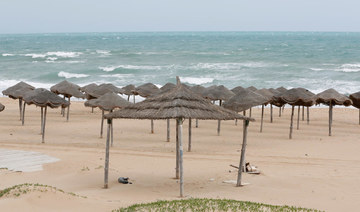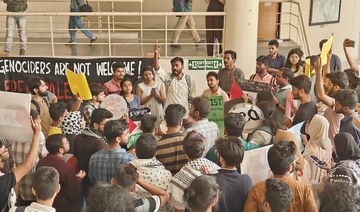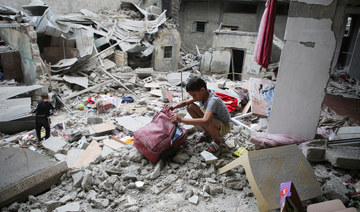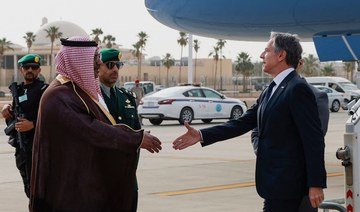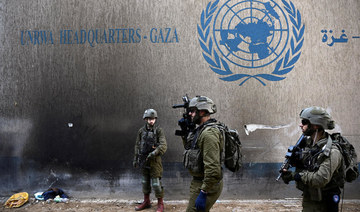TUNIS: A Tunisian NGO has set up a food bank that dispenses aid by text message to some 300 needy families rendered more vulnerable because of the coronavirus pandemic.
The initiative, which had been long in the making, was finally launched at the end of April to coincide with the start of the holy Muslim fasting month of Ramadan.
It targets families who have lost jobs because of the lockdown imposed by Tunisia to contain the spread of the virus, like that of Messaouda Raouafi, a cleaning woman forced to stay indoors.
“Because of Ramadan and the lockdown I can no longer go out to work,” said the 49-year-old.
“I cannot clean homes and earn money to feed my seven children.”
Her family was among the 300 chosen by the women’s affairs ministry and signalled to the NGO known as the “Banque Alimentaire Durable” or Sustainable Food Bank.
Under the initiative, Raouafi receives a code by text message allowing her to spend 40 to 60 Tunisian dinars (around $21-32) weekly at specially designated grocery stores.
With that money, Raouafi has been able to buy basic goods such as oil, milk, coffee and flour.
Farah, who runs a grocery store in the working-class district of Kram, is among those who signed up to take part in the project.
“The money is sent to us ahead of time — that way the clients can buy what they want with the funds allocated to them,” she said.
Farah said this works much better than allowing customers to buy on credit, a system that takes its toll on her own finances.
“In our area there are many poor families and unemployed people,” she said, explaining why she decided to embrace the initiative.
A member of the NGO, Aisha Zakraoui, said she hopes the initiative will grow so as to reach more needy families across Tunisia.
The NGO also aims to help families become more self-sufficient through training in skills such as growing their own vegetables or baking bread to sell.
“Our objective is to provide food aid to needy people and in exchange they agree to take part in initiatives aimed at integrating them socially and professionally,” Zakraoui said.
Even before the virus outbreak, Tunisia has been struggling with economic and social hardship that has worsened since the country went into lockdown in March to battle the pandemic.
The government estimated that two million of Tunisia’s 11.5 million population were in need of financial assistance during that time.
In March and April, the government made emergency handouts of 200 dinars to vulnerable families.
Tunisia, which has officially declared 1,000 cases of the novel coronavirus including 45 deaths, began easing its lockdown on May 4.
In the early days of the containment measures, several hundred Tunisians had demonstrated in working class districts of the capital demanding government support and protesting the lockdown.
Needy Tunisians get food aid via text messages
https://arab.news/vszaz
Needy Tunisians get food aid via text messages
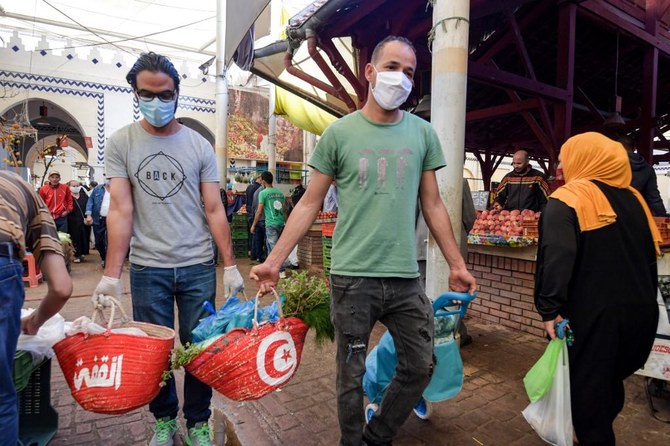
- The initiative was launched at the end of April to coincide with the start of Ramadan
- It targets families who have lost jobs because of the lockdown imposed by Tunisia to contain the spread of the virus
World Central Kitchen resuming Gaza work after 7 staff killed
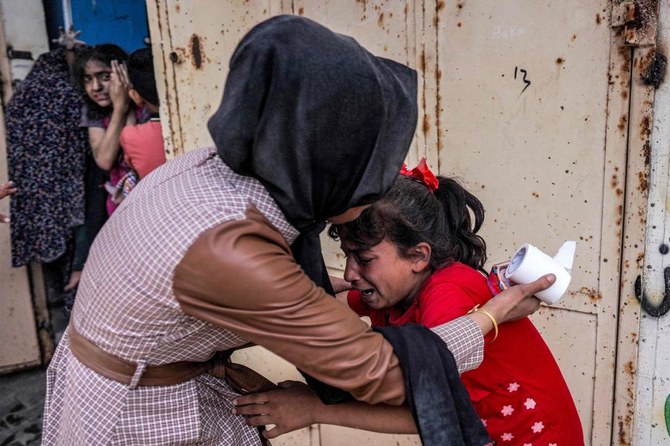
- US-based charity founded by celebrity Spanish-American chef Jose Andres provides food to communities facing humanitarian crises and disasters
- On the night of April 1, seven of its workers were killed in three air strikes over four minutes by an Israeli drone
WASHINGTON: The World Central Kitchen nonprofit, which supplied meals in Gaza until seven of its aid workers were killed by an Israeli strike nearly a month ago, is to resume operations, its CEO said.
The US-based charity founded by celebrity Spanish-American chef Jose Andres provides food to communities facing humanitarian crises and disasters.
On the night of April 1, seven of its workers were killed in three air strikes over four minutes by an Israeli drone as they ran for their lives between their three vehicles, the Israeli military has said.
The deaths — of an Australian, three Britons, a North American, a Palestinian and a Pole — triggered renewed levels of global outrage over Israel’s military operations.
“We continue to grieve and mourn the loss of seven of our friends and colleagues who were killed in an IDF attack in Gaza,” the nonprofit’s CEO Erin Gore said in a statement Sunday.
She added that the World Central Kitchen was nonetheless “resuming operations in Gaza.”
Gore noted the organization had 276 trucks, with the equivalent of almost eight million meals, ready to enter through the Rafah Crossing.
“We will continue to get as much food into Gaza, including northern Gaza, as possible — by land, air, or sea,” she said.
WCK would also send trucks from Jordan, Gore said, adding that the organization was exploring a maritime corridor and utilizing Israel’s Ashdod Port.
Although the roofs of the three aid workers’ vehicles were emblazoned with large WCK logos, retired general Yoav Har-Even, who is leading Israel’s investigation, has said the drone’s camera could not see them in the dark.
An internal Israeli military inquiry found that the drone team had made an “operational misjudgment” after spotting a suspected Hamas gunman shooting from the top of an aid truck.
Gore said WCK had to make a difficult choice to “stop feeding altogether during one of the worst hunger crises ever... or keep feeding knowing that aid, aid workers, and civilians are being intimidated and killed.”
WCK has 68 community kitchens in the region, and is building a third high-production facility in Mawasi in addition to the other two in Rafah and Deir Al-Balah.
Hamas’s October 7 attack on southern Israel that triggered the war resulted in the deaths of about 1,170 people, mostly civilians, according to an AFP tally of Israeli official figures.
Israel’s retaliatory offensive has killed at least 34,488 people in Gaza, mostly women and children, according to the health ministry in the Hamas-run territory.
Only two states for Israel and Palestine can prevent all-out regional conflict: Egypt PM
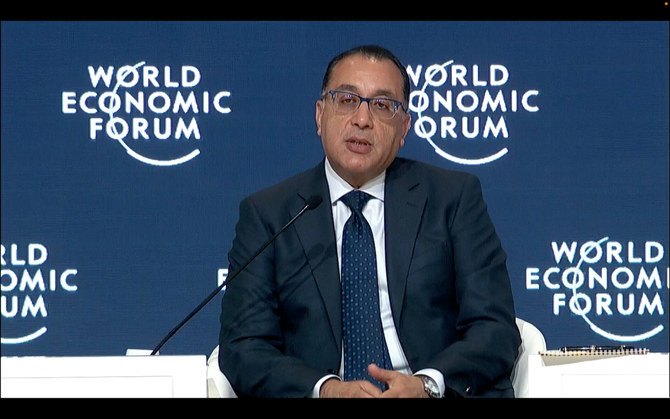
- Israel risking its future, says Egypt official at World Economic Forum
- Jordan’s PM also accuses Tel Aviv of not wanting ‘a political solution’
RIYADH: Only a two-state solution for Israel and Palestine can prevent the outbreak of an all-out regional and possible global conflict, said Egypt’s Prime Minister Mostafa Madbouli at the World Economic Forum here on Monday.
Participating in a panel discussion on Gaza, Madbouli said that if the current situation continues this would also affect the future of Israel.
“It is now or never, the whole world should unite to recognize the rights of Palestinians to have their own state. If you could imagine that postponing this will solve the problem, or will be in Israel’s interest, you are wrong. It will be against the future of Israel itself.”
He added: “We are speaking about a nation that has been under aggression and occupation for the past 75 years. Behind closed doors, everybody recognizes their right to exist, but when it comes to reality, and to have a solid solution, everybody is refraining.”
Madbouli said a two-state solution is the only remedy to achieve regional peace.
“It is today that we all have to push for a two-state solution, along with a serious regional solution. No one can imagine the situation if a regional war had to start. If you imagine that you are far then you are in a very elusive situation, everybody will be affected. We have already seen a sample of a war between Iran and Israel this month.”
Other panelists, including Jordan’s Prime Minister Bisher Al-Khasawneh and Sigrid Kaag, the UN humanitarian and reconstruction coordinator for Gaza, expressed their frustration with the situation on the ground.
Al-Khasawneh said: “This is indeed an extremely timely event, challenging and depressing. There are a lot of diplomatic activities underway, along with the continued Israeli aggression on Gaza and the potential for another catastrophic additional aggression on Rafah, which by all standards will be a catastrophe that adds on to a catastrophe that has led to conditions close to famine in Gaza.”
He said the damage caused by Israel’s campaign is estimated to be about $18.7 billion; and that the UN reports that 1.1 million children require psychological counseling.
Al-Khasawneh also called for a two-state solution: “Israel insists on making the same mistakes, and expecting different results, which is not engaging seriously in a political solution.”
He added: “The world seems to be falling into the trap of following the agenda of narrow-minded Israeli politicians, frankly speaking, and it is quite catastrophic. Today it is about the political calculations of some politicians in Israel at the expense of, the safety of Israelis, the safety of Jordanians, Egyptians, and all the Arabs. Today it’s the safety of the whole region and beyond.”
Kaag said a political solution has to be found. “If we look ahead, the reconstruction efforts, from an investment perspective, are all tied to the political parameters, the two-state solution.”
Kaag added: “The paradigm shift is in the now, but it’s also looking towards the future because of the level of destruction and despair, people there tell you that they feel like zombies. The mental health crisis is humongous. So, we need to create hope through investment, rehabilitation, and focus on the political effort. I think we failed the Palestinians countless times, and they deserve more human rights.”
Blinken ‘hopeful’ of Gaza ceasefire deal
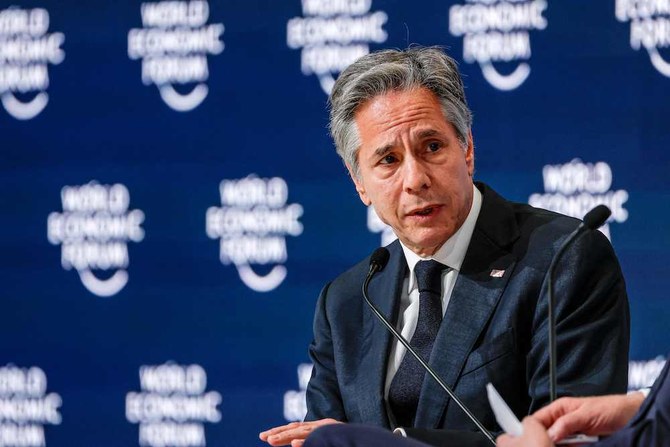
- Secretary of state confirms US opposition to Rafah incursion at WEF meeting in Riyadh
- Statement comes day after Palestinian President Abbas warns US ‘only country’ capable of averting catastrophe in Rafah
RIYADH: US Secretary of State Antony Blinken said he is hopeful Hamas will accept an “extraordinarily generous” ceasefire offer to stop Israel’s devastating Gaza offensive in return for the release of hostages.
“Hamas must decide, and decide quickly, whether to accept the extraordinarily generous offer for a ceasefire. I am hopeful they would make the right decision, and we can make a fundamental change in the dynamics,” the US official told a World Economic Forum panel in Riyadh.
A high-level Egyptian delegation flew in to Israel for talks last Friday amid a new diplomatic push for a truce in the six-month hostilities and the release of Israeli hostages held by the Palestinian militants.
The conflict in Gaza, which began following the Hamas-led assault on southern Israel on Oct. 7 last year, has resulted in the deaths of almost 35,000 Palestinians, mostly women and children, and reduced 75 percent of the besieged enclave into rubble according to authorities there.
“We are working with partners trying to bring the conflict to an end, trying to ensure it does not spread and all of it is a collective effort. The quickest way to bring the Gaza conflict to an end is to get to a ceasefire and the release of hostages,” Blinken said, as he thanked Egypt and Qatar for their instrumental role in pushing for a truce and the release of hostages.
Blinken also reiterated US opposition to an impending Israeli military operation in Gaza’s southernmost city of Rafah in the absence of a plan to ensure civilians will not be harmed.
“We have not yet seen a plan that gives us confidence that civilians can be effectively protected,” Blinken said.
Israel has for weeks threatened to launch an all-out offensive in Gaza to destroy Hamas’s remaining forces.
Palestinian President Mahmoud Abbas, who spoke during a WEF panel a day earlier, said the US “was the only country capable” of preventing Israel’s long-feared invasion of Rafah, where more than 1.5 million Palestinians are currently living.
Only a “small strike” on Rafah would force the Palestinian population to flee the Gaza Strip, and the “biggest catastrophe in the Palestinian people’s history would then happen,” Abbas said.
Blinken said there was a “need to be ready for a day-after plan for Gaza to include what is to be done about security, governance and administration and humanitarian and reconstruction needs.
“A lot of work has been done on that, more work needs to be done,” he said.
Blinken also said that the “single biggest rebuke to both Iran and Hamas would be Israel having normal relations with every country in the region and the realization of the Palestinian state.
“The US and Saudi Arabia have done intense work together over the past months to focus on the Saudi-Israeli normalization agreement. I think it is is potentially close to completion,” he said.
“But for the normalization to move forward … two things would be required: calm in Gaza and a credible pathway to a Palestinian state.”
Blinken earlier joined the opening of a US-Gulf Cooperation Council meeting, where he told the region’s foreign ministers that the best way to ease the humanitarian catastrophe in Gaza would be to negotiate a ceasefire agreement that would release hostages held by Hamas.
The top US diplomat met separately with Saudi Prince Faisal bin Farhan, minister of foreign affairs, where they reviewed ways to strengthen bilateral relations and joint cooperation in various fields, the Saudi Press Agency said.
Egypt ‘hopeful’ of new Israel-Hamas truce: foreign minister
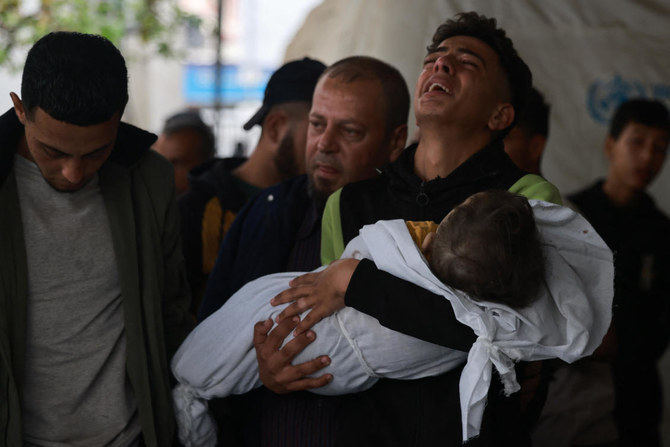
- A Hamas delegation was due in Egypt on Monday, where it is expected to respond to Israel’s latest proposal for a truce in Gaza
Riyadh: Egypt’s foreign minister said he was “hopeful” about a new proposal for a truce in Gaza as a Hamas delegation was due in Cairo for talks on Monday.
“There is a proposal on the table (and it’s) up to the two sides to consider and accept,” Sameh Shoukry said in Riyadh at the World Economic Forum.
“We are hopeful,” he added, explaining that “the proposal has taken into account the positions of both sides and has tried to extract moderation.”
“We are waiting to have a final decision. There are factors that will have an impact on both side’s decisions, but I hope that all will rise to the occasion.”
Egypt, Qatar and the United States have been trying to mediate an agreement between Israel and Hamas for months, but a flurry of diplomacy in recent days appeared to suggest a new push toward halting the fighting.
A Hamas delegation was due in Egypt on Monday, where it is expected to respond to Israel’s latest proposal for a truce in Gaza and a release of hostages after almost seven months of war.
A senior Hamas official said on Sunday that the Palestinian group had no “major issues” with the most recent truce plan.
“The atmosphere is positive unless there are new Israeli obstacles,” the official told AFP, requesting anonymity to discuss the negotiations.
Israel concerned over possible ICC arrest warrants related to Gaza war
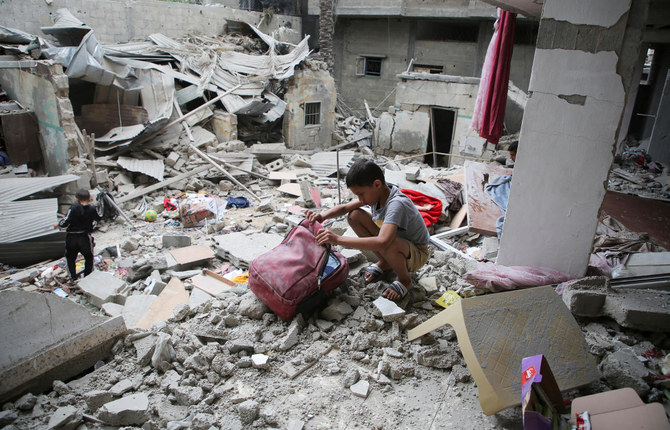
- Prime Minister Benjamin Netanyahu said on Friday that any ICC decisions would not affect Israel’s actions but would set a dangerous precedent
- Israeli officials are worried the court could issue arrest warrants against Netanyahu and other top officials for alleged violations in Gaza
JERUSALEM: Israel is voicing concern that the International Criminal Court could be preparing to issue arrest warrants for government officials on charges related to its war against Hamas.
The ICC — which can charge individuals with war crimes, crimes against humanity and genocide — is investigating Hamas’ Oct. 7 cross-border attack and Israel’s devastating military assault on Hamas-ruled Gaza, now in its seventh month.
In response to Israeli media reports that the ICC might soon issue arrest warrants for senior Israeli government and military officials, Foreign Minister Israel Katz on Sunday warned Israeli embassies to bolster their security because of the risk of a “wave of severe antisemitism.”
“We expect the court (ICC) to refrain from issuing arrest warrants against senior Israeli political and security officials,” Katz said. “We will not bow our heads or be deterred and will continue to fight.”
Prime Minister Benjamin Netanyahu said on Friday that any ICC decisions would not affect Israel’s actions but would set a dangerous precedent.
Israeli officials are worried that the court could issue arrest warrants against Netanyahu and other top officials for alleged violations of international humanitarian law in Gaza, Israeli media have reported.
They said the ICC is also considering arrest warrants for leaders from Hamas.
The ICC, based in The Hague, and Hamas, Gaza’s ruling group, did not immediately respond to requests for comment.
Israel is not a member of the court and does not recognize its jurisdiction, but the Palestinian territories were admitted with the status of a member state in 2015.
In October, ICC Chief Prosecutor Karim Khan said the court had jurisdiction over any potential war crimes committed by Hamas fighters in Israel and by Israeli forces in the Gaza Strip.
Khan has said his team is actively investigating any crimes allegedly committed in Gaza and that those who are in breach of the law will be held accountable.
On Oct. 7, Hamas led an attack on Israeli military bases and communities in which 1,200 people were killed, mostly civilians, and 253 were taken as hostages, according to Israeli tallies.
Israel has since launched a ground, air and sea offensive that has killed more than 34,000 Palestinians, according to Gaza authorities, and has laid much of the small, densely populated coastal territory to waste.
The Gaza Health Ministry does not distinguish between combatants and non-combatants in its casualty reports but most of the fatalities have been civilians, health officials say.
Israel says that it takes precautions to minimize civilian deaths and that at least a third of the Gaza fatalities are combatants, figures that Hamas has dismissed.
Israel’s military campaign has displaced most of the blockaded Palestinian enclave’s 2.3 million people and created a humanitarian crisis.
The case at the ICC is separate from a genocide case launched against Israel at the International Court of Justice, also based in The Hague.
The ICJ, also known as the World Court, is a United Nations court that deals with disputes between states, while the ICC is a treaty-based criminal court focusing on individual criminal responsibility for war crimes.




